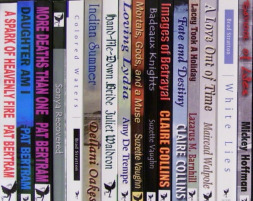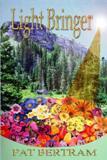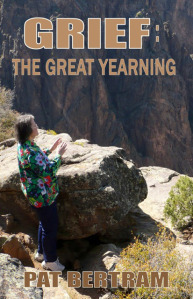Pat Bertram's Blog, page 280
February 12, 2012
How Do You Discover the Books You Want to Read?
 Two-and-a-half-years ago, I took an informal poll to find out how people discover new authors. I posted the following on discussion boards on both Goodreads and Facebook:
Two-and-a-half-years ago, I took an informal poll to find out how people discover new authors. I posted the following on discussion boards on both Goodreads and Facebook:
It seems as if there are as many ways of discovering books as there are readers, but I'm curious as to how you choose the books you want to read. Do you go by reviews? By recommendations from friends? Because you're familiar with other works by the author? Do you ever read a book because of an ad you saw? Because of a blog article? Because of a mention on a website such as Goodreads? Do you cruise book stores, libraries, or online sites like Amazon? Do you find them some way I haven't mentioned, such as gifts, perhaps?
Admittedly, the questions were loaded, but I still got an interesting and probably quite accurate overview:
Favorite authors or previously read authors: 36
Word of mouth: 26
Blog reviews/Book websites: 26
Goodreads/Shelfari: 24
Local bookstores: 21
Amazon/B&N/other online stores: 15
Library: 13
Publisher sites/newsletters: 5
Social networking sites like Facebook: 5
Book Clubs: 5
Author appearances/writing conferences: 5
NY Times bestseller list: 5
Offline reviews: 5
Yard sales/second hand bookstores: 4
Advertising: 3
Saw the movie: 3
Oprah: 1
Free downloads: 1
Gifts: 1
Recently, I posed the questions and got similar responses (though from a much smaller group):
books by favorite authors: 8
recommendations from friends: 5
browsing in bookstores: 4
libraries: 2
imprints (the trade name under which the book is published): 1
newspaper reviews: 1
blog reviews:1
recommendations from Amazon: 1
book clubs: 1
So, even with small independent publishing houses springing up like new forest growth, and self-published books proliferating like elm tree seeds, the means of finding books are still the same. That means, if you are an author looking for a readership, you need to be everyone's favorite author and have your readers recommend you. An almost impossible task when most people already have their favorite authors.
What about you? How do you discover the books you want to read? Or rather where. (A lot of people said they found books to read by the front cover or the blurb on the back, but I'm more curious as to where they saw the cover.)
Tagged: Amazon, book reviews, Facebook, favorite author, finding books to read, Goodreads, informal poll








February 11, 2012
Celebrating Twenty Weeks of Daily Blogging
On September 25, 2011, I made a vow to blog for 100 days straight without fail. I wanted to get back into the discipline of daily writing, but didn't want to make a major commitment such as writing a novel. I figured daily blog posts would satisfy the discipline and also satisfy the part in me that needs the reinforcement of completing a project. I passed the 100 day mark without even noticing, and now I've been posting a blog every day for twenty weeks — 140 posts. Surprisingly, very few are frivolous, posted just for the sake of posting something. So today, let's forget the seriousness of my usual posts. Let's forget that this is Saturday, my sadder day. Let's forget that my publisher, Second Wind Publishing, has moved to a new website and I have thousands of now-dead links to update. Let's forget all of that, and just play.
And if that isn't any fun, here's a jigsaw puzzle (I get such a kick out of these!)
Want more fun?
Click here to read the first chapter of: Light Bringer
Click here to read the back cover copy and an excerpt: Light Bringer
Click here to check out (and buy at $2.00 off!) Light Bringer at Second Wind Publishing's new site: Light Bringer
Tagged: jigsaw puzzle, Light Bringer, Light Bringer games, Pat Bertram, picture game, Second Wind Publishing

February 10, 2012
How To Keep From Having Too Much Exposition in Your Novel
 In an online discussion today, a writer asked what was the best way to keep from having too much exposition in your fiction, and how to insert it if necessary. Apparently, her character spends a lot of time alone, and she needed to know how to insert exposition during the long scenes when he is by himself.
In an online discussion today, a writer asked what was the best way to keep from having too much exposition in your fiction, and how to insert it if necessary. Apparently, her character spends a lot of time alone, and she needed to know how to insert exposition during the long scenes when he is by himself.
That is a tough situation. Characters alone are hard to write. They need someone to butt heads with, they need to show readers who they are through comparison or contrast with other characters, and they need allies and enemies. When a character is around others, tension is inevitable, so conflict comes naturally. When a character is by himself, he has perhaps less interesting conflicts — the environment, his own nature, personal disasters. A lot of books are based on such non-human antagonists or inner demons, but readers like to see characters acting and reacting with other characters.
In scenes with only one character, it's best to keep exposition to a bare minimum and focus on the action. One character alone for long periods of time without another character to butt heads with gets boring for readers, and exposition only exacerbates the problem. Feed the exposition into the story bit by bit as you need it, and refrain from long exposition dumps.
My novel Light Bringer, available from Second Wind Pubishing, is based on myth, both Sumerian myths and modern conspiracy theories, and all of that background information had to be presented to show the sweep of history. I created a discussion group among several colorful characters, each with his or her own take on the situation, then used the various conspiracy theories to help create the the characters and show their differences, which became a lively and painless way of dealing with the exposition. In addition, I ended up with a cast of ready-made characters I could pull from whenever I needed a minor character to fulfill a role.
The best way to insert exposition, though, is to make one character desperate to get the information, that way readers will want it, too. I used that technique in A Spark of Heavenly Fire, also available from Second Wind Publishing. The thriller required a lot of background information about biological warfare. I made one character desperate to hear the information, but I parceled it out bit by bit to make his desperation for the truth grow stronger while he became increasingly sickened by what he learned.
But you can't use that particular technique with a single character, unless perhaps he is ransacking someone's files, all the while fearful of being discovered. With a single character, it's best to keep with action. Exposition slows the pace of the book, so does a single character unless he is dealing with a lot of external conflict.
Exposition can also be used to give readers a breather between fast-paced scenes, but even so, information dumps seldom add to the excitement of a story, so they have to be used sparingly. Exposition is best spread throughout a book, feeding readers only that which they need to know in order to understand the current scene.
A common mistake beginning writers make is to think that readers need to know the entire backstory before they can get involved with the characters, and so first chapters are generally exposition-heavy. I have a great fix for that — leave everything as is until the book is completely finished, then cut out the first chapter. (Which is what I did for A Spark of Heavenly Fire.) You will be amazed at how much of that first information dump is spread delicately throughout the book when needed, making the first chapter redundant. Of course, if there is a bit of necessary information in the deleted chapter that does not appear in the remaining chapters, it's easy enough to find the proper place to insert it. The first chapter of a book should begin in the middle of the action, not before the action even begins. And speaking of first chapters, please, don't ever use flashbacks in the opening scenes. Establish your story, and then, if necessary, use flashbacks judiciously. By definition, flashbacks lack the immediacy of present action.
Tagged: background information, exposition, fiction writing, scenes with one character, Second Wind Publishing

February 9, 2012
Is "No Promotion" Really so Hard to Understand?
 I moderate a writing discussion group on Facebook where we've banned any kind of promotion. The point is to develop a sense of camaraderie among members, and to share writing tips, techniques, friendship. It's supposed to be a destination, a fun place to hang out, rather than a bulletin board with links to other sites. It's almost impossible to get people to understand the benefits of such a group. The following correspondence I had with a Facebook Friend (now a former Facebook friend) is a graphic example. FBF joined the group on December 18, participated in a few discussions, and then sent me an interview for my interview blog.
I moderate a writing discussion group on Facebook where we've banned any kind of promotion. The point is to develop a sense of camaraderie among members, and to share writing tips, techniques, friendship. It's supposed to be a destination, a fun place to hang out, rather than a bulletin board with links to other sites. It's almost impossible to get people to understand the benefits of such a group. The following correspondence I had with a Facebook Friend (now a former Facebook friend) is a graphic example. FBF joined the group on December 18, participated in a few discussions, and then sent me an interview for my interview blog.
December 20 — FBF: Did you receive my interview? I felt really good about my answers. What did you think?
December 23 — PB: Yes, I received it. Haven't read it yet, but I did see it. I'll read it when I format it for the site. It will be perhaps in a week.
December 23 — FBF: Yeah. You answered me on a post in the group so I already knew. I'm very excited. Thank you for doing this for me. You are amazing. Don't let those promo people bug you. They obviously lack the social skills necessary to make friends and understand what professional respect means.
December 23 — PB: Actually, the one that bothered me the most was the guy who posted on the wall that what he hated was my whining about no promo. Before you joined, all anyone posted was promo, and some of the members rebelled. I was pleased because I'd just about decided to dismantle the whole thing. I think we're developing a great group. Thank you for joining and for participating in our discussions.
December 23 — FBF: Your welcome. I've already gotten my book on two websites. An interview and two reviews in progress. And I never promoted my book once! So thank you.
December 23 — PB: See, that's the whole point. Get to know people, and let them promote your book! And you're welcome. I am glad to do what I can.
December 31 — PB: Hi. I posted your interview. Thank you! Sorry it took so long. Let me know if you need me to make any changes.
January 1 — FBF: It's great. Thank you.
January 10 — FBF (in response to the question what three words describe your writing?): Comical, dialogue, needs-improvement. But that's why I'm here.
February 8 — FBF: I posted a promo (a book trailer) on the group wall yesterday for a good writer, and it was removed. I've had enough. I'm outa here. [And then he used a lot of not-so-nice words.]
Tagged: Facebook, Facebook groups, social networking

February 8, 2012
Building Better Plots
In Building Better Plots, Robert Kernen provides a quick quiz to help you decide if your subject matter is strong enough to sustain a novel. I thought these questions were interesting enough to pass along:
 Does your concept create obstacles that effectively challenge the characters? If so, which specific elements will be the source of that challenge?
Does your concept create obstacles that effectively challenge the characters? If so, which specific elements will be the source of that challenge?
Does your concept provide a strong backdrop for exploring the strengths and limitations and psychology of your characters? What specific elements does the plot have that provide vivid comparisons and contrasts that will delineate your character in intriguing ways?
Does your concept provide a strong environment for the messages and themes you want to explore? What metaphors and motifs grown naturally out of that environment will illuminate those themes and messages?
Does your concept provide any realistic hooks that will make it easy for the audience to relate to? What elements will they relate to? Even if you are writing science fiction or fantasy, you will want to give your audience some element to which they can connect their sympathy.
Does your concept provide enough tension to hold the audience's interest? What are those sources of tension?
The questions seem a bit complicated to help create a story — by the time you've answered them all, you'd be sick of the story — but it seems they would be ideal as a tool to help clarify a muddy middle.
Tagged: backdrop, Building Better Plots, realistic hooks, Robert Kernen, Setting, story concept, story themes








February 7, 2012
Grief: Overflowing Into the Empty Places
 During all these months of posting blogs about my grief journey, I never understood their emotional impact on others. To me, writing the posts was all about finding words to explain how I felt so that perhaps those who had never experienced the loss of a soul mate could understand a little of what their bereft friends and family are feeling. But even more than that, it was about finding a measure of peace.
During all these months of posting blogs about my grief journey, I never understood their emotional impact on others. To me, writing the posts was all about finding words to explain how I felt so that perhaps those who had never experienced the loss of a soul mate could understand a little of what their bereft friends and family are feeling. But even more than that, it was about finding a measure of peace.
Grief is a difficult journey, and it's made even more difficult when you lose a life mate/soul mate because the one person you need to turn to for support is the one who is gone. It's also why, for some people, grief grows during the second and perhaps even the third year — the further you get away from your mate and your shared life, the more you need to talk to him about your bewilderment at his being so very gone from your life. You want to talk with him about the changes you've made in your life, to discuss ways of continuing to live without him, to share bits of your journey and show your growth. But he is not here to respond, and never will be again.
I've used this blog as a way of crying out to cyberspace, flinging my words to the electronic winds, sharing all those thoughts I can no longer share with him. And oddly (to me, anyway since it was never my intention) my grief somehow ends up overflowing into the empty spaces between the words, just as my sadness overflows into the empty spaces of my life. This emotional overflow is even odder when you consider that often when I write the posts, I am not feeling particularly bereft.
Yesterday I noticed that one of my grief blogs was getting an upsurge of views, and out of curiosity, I scanned the article to see what had caught people's attention. Unexpectedly, the emotion of my words slipped through my usual editorial block and slammed into me. I started weeping. I don't know how all that emotion ended up in a few hundred squiggles on a webpage (because, after all, letters are simply squiggles with no intrinsic meaning except that which we give them), but the sorrow is undeniable.
I've never been able to read my grief book all the way through. I had to edit in bits and pieces, and to depend on others to copyedit the book for me. All that angst just waiting between the covers of a book! I don't quite know what to make of it. I don't know why it was so important to me to show people that grieving is okay and even necessary, don't know how so much of myself ended up in the book, don't know where I got the courage to be publicly vulnerable. And yet, there it is, or rather, it there it will be in a couple of weeks when the book is finally released.
Tagged: emotional words, grief, grief blogs, Grief: The Great Yearning, loss

February 6, 2012
Super Bowl Overview
Overview of the Black Canyon of the Gunnison, a natural super bowl.
(Sorry. I couldn't resist.)
Tagged: Black Canyon of the Gunnison, photo, super bowl

February 5, 2012
A Cook's Tour of the English Language by Rod Marsden — Part III
A few days ago in one of my Facebook discussion groups, Rod Marsden, author of Disco Evil: Dead Man's Stand and Ghost Dance left a comment about The Canterbury Tales and the origin of language that stunned me with its depth and beauty. Facebook seems to pride itself on unwitty witticisms, too-cute aphorisms, and political opinionating all mixed together in a big pot of self-aggrandizement, and the remark struck me as being too important to be swallowed up by that voracious maw. I asked Rod if he'd like to expand on his comment and let me post it here. He sent me an awesome tribute to the English language that I've posted in three parts. I hope you will be as fascinated with Marsden's tour of the English language as I am. Click here for: A Cook's Tour of the English Language by Rod Marsden — Part I and A Cook's Tour of the English Language by Rod Marsden — Part II
A Cook's Tour of the English Language — Part III
by Rod Marsden
In Australia, there has been continual influence, both English and American, upon the Australian version of the English language. As with the USA, the separation in time and space from England also meant that Australians would and indeed did develop their own style of English. Back in the late 19th Century and early 20th Century, London cockney could be heard in the streets of Sydney along with the rhyming slang familiar to Londoners. Example: Apple and pears, stairs, trouble and strife, wife. A man might say that he's going up the apples and pears and those in the know would take it he was about to go up the stairs. A man might say I'm having lunch with my trouble and strife and those in the know would take it he was going to have lunch with his wife. By the 1920s, however, cockney and rhyming slang was considered old fashioned and was on the way out. Hence when you have an American playing the role of an Australian in a show like MASH, which is set in the 1950s, it is somewhat laughable when the fellow comes out with this very English but no longer very Australian cockney accent.
Terms common in Australia but perhaps not common elsewhere are Bloke (man), Sheila (woman), Mate (friend), Cobber (friend you work with) and Bludger (someone who relies on other people to do the work). Words that had to be added to describe animals not found elsewhere in the world include emu, koala and platypus. These words come from the Aborigines, the Native Australians. In Australia a ranch is a station and a cowboy is a jackaroo. A cowgirl, incidentally, is a jillaroo. Someone from England is still often referred to as a Pommy. Australia has its own dictionary, the Macquarie dictionary.
My grandfather was born in England and as a young man came to Queensland, Australia. He got a job on a cattle station as a jackaroo. He may in fact have been the Pommy Jackaroo of legend. In any event, when the First World War broke out, he had the choice of going back home to join up or going with his mates. He ended up joining the Australian light horse. It should be noted that the only successful cavalry charge I know of during the First World War was made by the Australian light horse at Bathsheba.
The term Pommy I believe is an old cricket term and in my mind has always been connected with the Ashes. The Ashes has quite a history. It was once theorized by an English critic that if ever an Australian team of cricketers beat a British team it would spell the death of cricket. When this did happen there was an obituary for Cricket in an English newspaper and the leader of the British team burnt part of the equipment used in the game and put the ashes in a little funeral urn. We're been playing against the British ever since for these ashes.
The idea of fair play is very much entrenched in the game of cricket to the extent where one can say 'it's not cricket' to mean that something is unfair.
There is the theory that, because of television and computers, English throughout the world will become more and more standardized. This may happen and indeed it could be happening but I can't see such a thing being completed in the near future.
The term Cook's tour came about in the 19th Century but works today in referring to travel that is somewhat short and limited. Obviously, I could go into a lot more detail about the English language and how it has developed and is developing in various countries. I could write several books and not tell the complete story because, truth to tell, such a project will never be complete until the language dies and I can't see that happening in the near future. No doubt there will be future efforts to purify the language which will inevitably fail. The language gets its strength from growth; therefore, trying to purify the language is not a good idea in any event.
I hope you have enjoyed the read.
***
 Rod Marsden has a BA in Liberal Studies, a Graduate Diploma in Education and a Master of Arts in Professional Writing. Rod's short stories have been published in Australia (Small Suburban Crimes anthology), New Zealand (Australian Animals are Smarter than Jack 2 anthology), England (Voyage magazine), Russia (Fellow Traveler magazine) and the USA (Cats Do it Better than People anthology, Night to Dawn magazine, Detective Mystery Stories magazine). Then there is the more recent NTD book, Undead Reb Down Under Tales.
Rod Marsden has a BA in Liberal Studies, a Graduate Diploma in Education and a Master of Arts in Professional Writing. Rod's short stories have been published in Australia (Small Suburban Crimes anthology), New Zealand (Australian Animals are Smarter than Jack 2 anthology), England (Voyage magazine), Russia (Fellow Traveler magazine) and the USA (Cats Do it Better than People anthology, Night to Dawn magazine, Detective Mystery Stories magazine). Then there is the more recent NTD book, Undead Reb Down Under Tales.
Marsden lives on the south coast of NSW, Australia.
-
Click here for: A Cook's Tour of the English Language by Rod Marsden — Part I
Click here for: A Cook's Tour of the English Language by Rod Marsden — Part II
Tagged: Australian terms, English language, jackaroo, Mash, rhyming slang, Rod Marsden, The Ashes

February 4, 2012
A Cook's Tour of the English Language by Rod Marsden — Part II
A few days ago in one of my Facebook discussion groups, Rod Marsden, author of Disco Evil: Dead Man's Stand and Ghost Dance left a comment about The Canterbury Tales and the origin of language that stunned me with its depth and beauty. Facebook seems to pride itself on unwitty witticisms, too-cute aphorisms, and political opinionating all mixed together in a big pot of self-aggrandizement, and the remark struck me as being too important to be swallowed up by that voracious maw. I asked Rod if he'd like to expand on his comment and let me post it here. He sent me an awesome tribute to the English language that I started posting yesterday, and will finish posting tomorrow. I hope you will be as fascinated with Marsden's tour of the English language as I am. Click here for: A Cook's Tour of the English Language by Rod Marsden — Part I
A Cook's Tour of the English Language — Part II
by Rod Marsden
In places like Boston there were attempts to keep the emerging American version of the English language pure. As in England, such attempts were doomed to failure. The USA expanded and, with every new territory and then state added to the union, came new ideas and new words. How, for example, can you keep Spanish out of the language when California and New Mexico are part of the USA? How can you lock the door on further French influence when cities such as New Orleans are in the country and you have some French influence floating down the Hudson from Canada, your northern neighbour? Was the adoption of foreign words into the language democracy in action? There were those who would make this argument. It was certainly made in England in the 19th Century when English scholars were examining their language.
Some of the words that came from Spanish into English from the cattle trade are rodeo, lasso and hacienda. I believe Mustang is also Spanish. The guitar has its origins in Spain. San Francisco is a city named after a Spanish saint. Los Angeles is Spanish and has the meaning of city of Angels. Did the Spanish language add a certain type of richness to the American version of English? I would think so.
There had to be a definitive dictionary for the USA. It came out of a small blue book written by Webster in the 19th Century that could be purchased cheaply by anyone in the USA. Earlier attempts had been made but it was Webster who had the right handle on what the USA was about and what would work best in the USA. As the work expanded, certain areas of English were modernized to make the written language more palatable for everyone. Colour, for example, became color. Defence became defense. Centre became center. Gaol became jail. It was very much a case of making the written language more phonetic. This of course was not always easy or even possible. For example, in Davy Crockett's part of the USA, thanks to Scottish and perhaps German influence, the word bear is actually pronounced bar. Compromises then had to be made.
Also words used by Americans could have a different meaning to the way they were used in England. Store, for example, was similar in meaning to warehouse to the English. In the USA store came to mean shop. Today, in Australia, you can use either the word shop or store to mean basically the same thing.
The gold rush and the push west in the 19th Century added lots of words to American English. Red-neck, for example, originally meant the migrants who could not afford passage on riverboats and so travelled by raft. They got red necks because they didn't have much protection from the sun and when they turned to farming they got red necks in the fields they ploughed as well. 'Slap leather' was a call to fight a duel with guns. 'Honest Injun' as well as 'you speak with forked tongue' either came directly out of the west or the eastern chap books connected with the west. 'Get along little doggie' came from the cattle trade. Cowboys were once nothing more than common workers but all that was changed with eastern publications and then Hollywood cinematography. Stories about gunfighters like Billie the Kid and Wyatt Earp also had their influence on the language. Slowly but surely Native American words also made it into American English. There were words such as wampum and wigwam.
By the end of the 19th Century new ways of working with steel were developed in the USA. This led to building being constructed first in Chicago and then in New York that could literally scrape the sky. Yes, the skyscraper (an American term) was born. From the mid-19th Century onwards there was a great influx of migrants from Europe into the USA. There was the Irish escaping famine. There were European Jews fleeing persecution from countries such as Russia. There were also the Italians and the Chinese.
During the American Civil War (1861-1865) there were Irish migrants in American army uniforms. Some fought for the north and others for the south. At times a regiment made up of Irish in blue would be lined up against a regiment of Irish in grey. Regardless, the Irish whether protestant or Catholic (both came to the USA) have had a great influence on American life, on the American belief in liberty and justice and on the language.
In 1917 an American writer of Irish Catholic descent by the name of George M. Cohan wrote a song called 'Over There'. It is an inspirational piece known the world over. It was sung in both World Wars and is why many people throughout the world still prefer to refer to Americans as Yanks
The words:
Over there, over there,
Send the word, send the word over there
That the Yanks are coming, the Yanks are coming
The drums rum-tumming everywhere.
So prepare, say a prayer,
Send the word, send the word to beware -
We'll be over, we're coming over,
And we won't come back till it's over, over there.
As for the Jewish migrants that settled in the USA, their influence on the language and those of their descendants has been most profound. Entertainers such as the Marx Brothers brought a form of craziness and also a form of sophistication in comedy to first the stage and then the screen. The actor who first played Spock in Star Trek, Leonard Nimoy, is of a Jewish American background. The Vulcan salute that comes with the words 'Live long and prosper' comes out of his Jewish this background. When people think of peace they often think of that Vulcan salute with the thought that it is only logical to do so. Other Jewish Americas include Jerry Lewis, Barbara Streisand and Jack Benny (In his career he pretended to be a skinflint but in real life he was a very kind and generous fellow). Here perhaps I should note that skinflint is a purely American term.
The Italians that settled in the USA certainly did their bit to transform the language. They possibly began with the American diet. The introduced the word pizza and also the food. I don't know why but Americans have this tendency to call a pizza a pizza pie. In Australia, where there has also been Italian influence, we just call a pizza a pizza. Where does pie come into the equation? I have no idea. In any event, there were forms of Italian coffee such as espresso and cappuccino that became popular and whose names were added to the American dictionary. Famous Italian Americans include Liza Minnelli and Jimmy Durante who is better known as Shnozzles Durante because of his big shnozzola (nose). Possibly his most famous line was: "If it ain't broke, don't fix it."
It was the Chinese migrants that often did the dirty and dangerous jobs in the building of the American railway system in the 19th Century. Chinese style food came with the Chinese and so did Chinese names such as Chow Mein for it. The Chinese also brought with them the idea of fireworks for America's Fourth of July celebrations.
In the 20th Century, thanks to radio and movies then television, both American and British style English have expanded their influence and, as a consequence, been influenced by the rest of the world. New technical terms have arisen for new technical devices. Meanwhile old terms have been put to new use. The term computer was around before the 20th Century but our ideas of what a computer is and what it is capable of doing has grown enormously. Laptop is very much a late 20th Century and early 21st Century term referring to something that didn't exist in previous centuries. The space race with the Russians in the 20th Century brought about a revolution in thought and in word usage. Many people use aluminium or what the Americans call aluminum cookware. Non-stick pans came out of NASA experimentation.
***
 Rod Marsden has a BA in Liberal Studies, a Graduate Diploma in Education and a Master of Arts in Professional Writing. Rod's short stories have been published in Australia (Small Suburban Crimes anthology), New Zealand (Australian Animals are Smarter than Jack 2 anthology), England (Voyage magazine), Russia (Fellow Traveler magazine) and the USA (Cats Do it Better than People anthology, Night to Dawn magazine, Detective Mystery Stories magazine). Then there is the more recent NTD book, Undead Reb Down Under Tales.
Rod Marsden has a BA in Liberal Studies, a Graduate Diploma in Education and a Master of Arts in Professional Writing. Rod's short stories have been published in Australia (Small Suburban Crimes anthology), New Zealand (Australian Animals are Smarter than Jack 2 anthology), England (Voyage magazine), Russia (Fellow Traveler magazine) and the USA (Cats Do it Better than People anthology, Night to Dawn magazine, Detective Mystery Stories magazine). Then there is the more recent NTD book, Undead Reb Down Under Tales.
Marsden lives on the south coast of NSW, Australia.
-
Click here for: A Cook's Tour of the English Language by Rod Marsden — Part I
Tagged: English language, gold rush, over there, pizza pie, rednecks, Rod Marsden, Webster's dictionary








February 3, 2012
A Cook's Tour of the English Language by Rod Marsden — Part I
A few days ago in one of my Facebook discussion groups, Rod Marsden, author of Disco Evil: Dead Man's Stand and Ghost Dance left a comment about The Canterbury Tales and the origin of language that stunned me with its depth and beauty. Facebook seems to pride itself on unwitty witticisms, too-cute aphorisms, and political opinionating all mixed together in a big pot of self-aggrandizement, and the remark struck me as being too important to be swallowed up by that voracious maw. I asked Rod if he'd like to expand on his comment and let me post it here. He sent me an awesome tribute to the English language that I will be posting over the next three days. I hope you will be as fascinated with Marsden's tour of the English language as I am.
A Cook's Tour of the English Language — Part I
by Rod Marsden
The earliest known example of English literature is the epic poem Beowulf. We can tell by its complexity and execution that it's not written by a beginner. We know by its structure that it harks back to a long oral tradition of tale spinning. Strangely enough, there is much in common with Beowulf and the tall tales produced in the USA in the 18th and 19th Centuries. The stories associated with Davy Crockett are a great example of this sort of thing. Certainly poems and stories produced by Australian author Banjo Paterson in the 19th Century have a powerful Beowulf like feel to them.
It was through Geoffrey Chaucer in the 14th Century that English as a written language made its first big step. Even at this stage it was far from being a pure language. In Geoffrey Chaucer's The Canterbury Tales he used words that had their origins in Ancient Greek, Latin, Anglo-Saxon, Norman French and what was then regarded as Modern French. If he wanted to say something in a blunt, straightforward way most Englishmen would understand he would use Anglo-Saxon. If he wanted to be eloquent then he would use either Norman French or Modern French. French in those days was very much a language of nobility and the European courts. Latin was a more universal language and was tied in with English grammar. Ancient Greek had a lot to do with the natural sciences as well as its connections to great writers of a past age.
Geoffrey in his writing brought new words into the English language and revived words that had been around for some time but had fallen into disuse. He was playful with language but also a great craftsman with it. He had his cast of characters on a holy pilgrimage to Canterbury. They were a good social mix of high and low. Possibly the most famous or infamous was the wife of Bath. Sometime after Geoffrey's death this feisty fictional female was still alive in song. There's a ballad in which she goes to the pearly gates and St. Peter refuses to let her in. She of course kicks up such a stir that he has to eventually open the gates for her just to keep the peace. Did Geoffrey in his life time actually know someone like the wife of Bath? I would say so but we'll never know for sure.
Understandably, Geoffrey feared that his writing, being in English, would not survive the test of time. He knew that the pronunciation of English differed greatly throughout the kingdom as did the spelling. To this day there are still variants in dialect but perhaps not as pronounced as in his day. For example, a place of worship near the Scottish border was known as a Kirk. In London, however, the same place of worship went by the more French influenced name of Church. Chances were good that a person living on the border would not know what a Church was and a person living in London wouldn't have a clue about a Kirk. So there wasn't really a common English language in Geoffrey's day and, as far as The Canterbury Tales were concerned, he could only hope that it would be understood by enough people throughout the land.
Before The Canterbury Tales there was The Decameron. It was written by Giovanni Boccaccio. This was the first great epic poem written in the growing language of Italian rather than in the then more conventional Latin. It dealt with a group of well off young people who had gone into the country to escape the plague. To pass the time until they could return to their city they told each other stories. Like The Canterbury Tales, these stories were not confined to the author's place of origin. They roamed with the writer's imagination which makes them quite readable even in translation today. By the end of the 14th Century, between The Canterbury Tales and The Decameron, literature was flourishing in England and Italy in ways it had never flourished before. For a start, it was doing so in the common languages of the people and not just the languages of scholarship such as Latin and Ancient Greek.
The next great step forward for the English language took place during the reign of Elizabeth the first. She was, among other things, the first really good ruling queen the English had ever had. What's more, England had a fleet of war ships capable of real defence against aggressive neighbours. The queen also understood good P.R. She commissioned playwrights such as William Shakespeare to not only entertain and inform but also to create excellent propaganda for her. When Britain was threatened by the Spanish Armada, she spoke personally to some of those tasked with defending her realm. What comes down to us as her speech on this occasion may not be verbatim but it is still quite stirring. She understood how we can be moved by words, especially words in our own language.
At the time William Shakespeare was writing, the world was in transition. Old superstitions were beginning to die away to be replaced by a new emphasis on the various sciences. This was made clear in his play, The Tempest. In his writing, Shakespeare sometimes turned what were traditional nouns into adverbs. He also invented new words and put old words to new use with new meanings.
England, in becoming more a seafaring nation than ever before, was receiving words into the language by the bushel. The French, in doing business with Arab people, adopted Arab words for the new spices such as pepper coming into common use in Europe. They of course gave the Arab words a French slant. The English, in doing business with the French, also came to adopt both these new words and goods. With new, improved commercial vessels able to travel further than ever before the language grew. It was also becoming more international though it would be a long while before it could compete successfully with French and Latin.
There still wasn't a dictionary for English that everyone could agree on. Even the name Shakespeare wasn't always spelt the same way so spelling was also problematical. Even with the printing press coming into use in England in the 15th Century, the issue of how to spell the most common of English words had not been resolved and was still to be resolved centuries later in Shakespeare's day. From the 15thCentury to well into the 17th Century a word in print might be spelt several ways in the same document and retain the same meaning. This, of course, was confusing to anyone attempting to read English.
When Englishmen first set sail to colonize parts of America there wasn't a dictionary that encompassed the entire English speaking population so the style of English that went with the colonizers was the style the colonizers had grown up with. By the time there was a definitive English dictionary celebrated in England, time and distance meant that it could no longer be definitive for the people of English descent living in America. Then there was the War of Independence and the United States of America became a separate entity from the British Empire. Even so, the Constitution of the United States is written in concise and precise English that every Englishman and American to this day can understand. In this regard it is a testimony to the strengths of the language and its general robust nature.
***
 Rod Marsden has a BA in Liberal Studies, a Graduate Diploma in Education and a Master of Arts in Professional Writing. Rod's short stories have been published in Australia (Small Suburban Crimes anthology), New Zealand (Australian Animals are Smarter than Jack 2 anthology), England (Voyage magazine), Russia (Fellow Traveler magazine) and the USA (Cats Do it Better than People anthology, Night to Dawn magazine, Detective Mystery Stories magazine). Then there is the more recent NTD book, Undead Reb Down Under Tales.
Rod Marsden has a BA in Liberal Studies, a Graduate Diploma in Education and a Master of Arts in Professional Writing. Rod's short stories have been published in Australia (Small Suburban Crimes anthology), New Zealand (Australian Animals are Smarter than Jack 2 anthology), England (Voyage magazine), Russia (Fellow Traveler magazine) and the USA (Cats Do it Better than People anthology, Night to Dawn magazine, Detective Mystery Stories magazine). Then there is the more recent NTD book, Undead Reb Down Under Tales.
Marsden lives on the south coast of NSW, Australia.
Tagged: Beowulf, English language, pepper, Rod Marsden, Shakespeare, The Canterbury Tales, The Decameron














